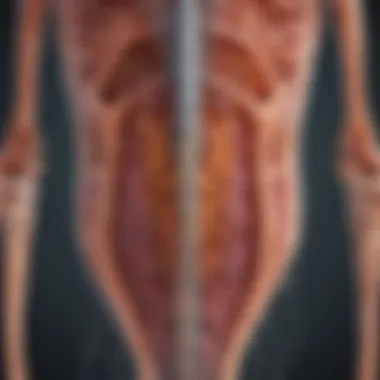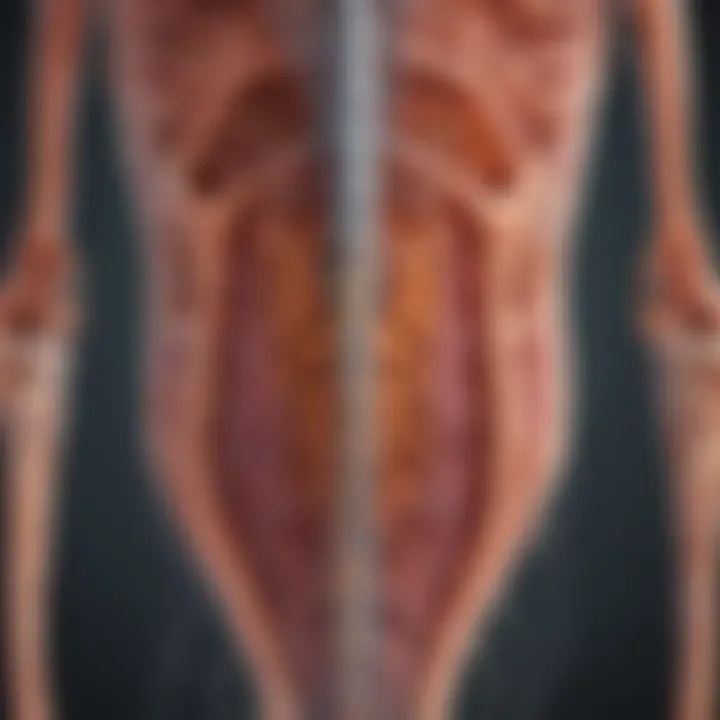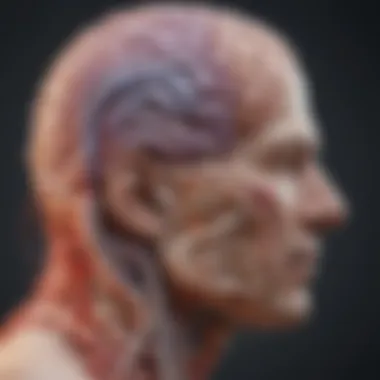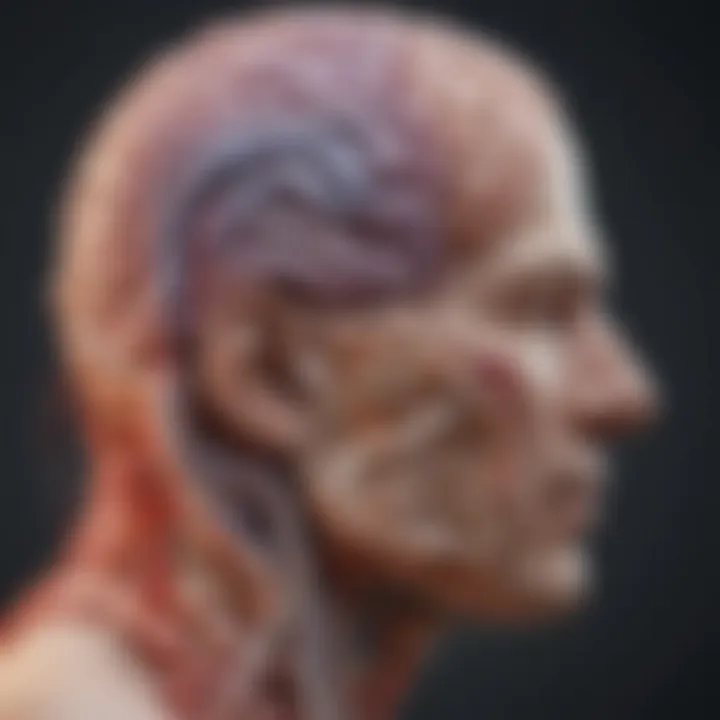Vagus Nerve and Gut Health: The Intricate Connection


Intro
The relationship between the vagus nerve and gut health is an area of growing interest in both the fields of neurology and gastroenterology. This connection plays a key role in how our body processes food, manages stress, and regulates immune responses. Understanding this interplay can shed light on various health issues and pave the way for new treatment approaches.
Research Overview
Key Findings
Recent studies show that the vagus nerve is central to communication between the brain and the gastrointestinal system. This communication is bidirectional, meaning the brain can influence gut functions, and gut health impacts brain functions, including mood and anxiety. For instance, stimulation of the vagus nerve has demonstrated potential in alleviating symptoms of anxiety and improving digestive disorders.
Study Methodology
Research in this area employs diverse methodologies, including clinical trials, animal studies, and neuroimaging techniques. Researchers focus on vagal stimulation devices and their effectiveness in treating conditions like epilepsy and depression, while examining how these treatments can influence gut microbiota.
Background and Context
Historical Background
The vagus nerve has long intrigued scholars. Historically, it has been linked to various physiological functions, but its role in gut health is more recent. Key discoveries over the last few decades have highlighted its importance in signaling and gut motility.
Current Trends in the Field
Currently, there is an increasing trend towards understanding the gut-brain axis. This approach looks at how gut health affects mental well-being and vice versa. Studies are emerging, demonstrating the profound impact that gut microbiota can have on mood and cognitive function. Research articles often feature powerful correlations between vagal tone and both emotional and physiological health outcomes.
"The vagus nerve links the brain to the gut, having implications for both digestive health and mental wellness."
This relationship opens doors to novel therapeutic strategies in treating conditions such as anxiety, depression, and chronic digestive issues. Integrating findings across disciplines provides a holistic view of human health.
Preamble to the Vagus Nerve
The vagus nerve is a critical component of the autonomic nervous system, influencing numerous bodily functions. This section aims to provide an essential foundation for understanding how the vagus nerve interacts with gut health. As this relationship is crucial for the overall functionality of the GI system, a thorough examination of relevant concepts will be beneficial. By unpacking the intricacies of the vagus nerve, we can appreciate its importance in regulating digestive processes, emotional well-being, and how it can be affected by various health conditions.
Definition and Overview
The vagus nerve, known as the tenth cranial nerve, is the longest nerve of the autonomic nervous system. It extends from the brainstem down to the abdomen, interfacing with multiple organs, including the heart, lungs, and digestive tract. Its name, "vagus," comes from the Latin word for "wandering," which aptly describes its extensive reach throughout the body.
The vagus nerve plays a pivotal role in the parasympathetic nervous system, which governs the body's rest-and-digest responses. This contrasts with the sympathetic nervous system, which triggers fight-or-flight reactions. The vagus nerve's influence on bodily functions is profound; it helps regulate heart rate, digestive processes, and even certain aspects of mood regulation. Misfunction of this nerve can lead to various health issues, emphasizing the need for understanding its role in our physiology.
Anatomical Pathways of the Vagus Nerve
The anatomical structure of the vagus nerve is complex and complex but can be summarized into key regions:
- Cranial Portion: Originates from the medulla oblongata in the brainstem.
- Cervical Pathway: Travels down through the neck, providing branches to the lungs and heart.
- Thoracic Pathway: Continues to the esophagus, giving off branches to various thoracic organs.
- Abdominal Pathway: Terminates by innervating many abdominal organs, including the stomach, intestines, and liver.
This vast network illustrates why the vagus nerve has a significant impact on the gut and overall health. Each section of the nerve has specific roles and functions, interacting with different systems to maintain homeostasis.
Functions of the Vagus Nerve
The functions of the vagus nerve are diverse and multifaceted. Key functions include:
- Digestive Regulation: It stimulates peristalsis, which is the wave-like muscle contractions that move food through the digestive tract.
- Heart Rate Modulation: Plays a role in calming the heart rate and maintaining blood pressure levels.
- Respiration Control: Influences lung function, ensuring proper respiratory patterns.
- Emotional Regulation: Impact on mood and emotional wellbeing, as it can relieve stress responses through mechanisms involving neurotransmitters.
Understanding these functions provides critical insight into how the vagus nerve contributes to gut health, suggesting that any disorder of this nerve could lead to digestive or psychological issues.
"The vagus nerve serves as the main communication pathway between the brain and the gut, highlighting its vital role in maintaining health."
Through this exploration of the vagus nerve, we can better understand its relevance to gut health and overall wellness.
Understanding Gut Health
Understanding gut health is crucial for grasping the intricate connections between the vagus nerve and overall health. The gut, often referred to as the second brain, plays a significant role in many bodily functions. It is not merely a digestive organ; it influences the immune system, mental health, and hormonal balance. Poor gut health can lead to a cascade of health issues, including digestive disorders, autoimmune diseases, and mental health problems.
Definition of Gut Health


Gut health refers to the balance and functionality of the digestive system, particularly the gastrointestinal tract. A healthy gut enables the body to break down food properly, absorb nutrients efficiently, and maintain a balanced microbiome. This also includes ensuring a well-functioning intestinal barrier that prevents harmful substances from entering the bloodstream.
Components of Gut Health
Several essential components contribute to gut health:
- Microbiota: These are trillions of microorganisms, including bacteria, viruses, and fungi, that reside in the digestive tract. They aid in digestion and influence immune function.
- Gut Barrier: The intestinal lining serves as a barrier to prevent toxins and pathogens from passing into the bloodstream while allowing nutrients to be absorbed.
- Gut Motility: This refers to the movement of food through the digestive system. Proper motility is essential to prevent issues like constipation or diarrhea.
- Digestive Enzymes: These biochemical substances help in breaking down food into smaller, absorbable components.
Gut Microbiota and Its Importance
Gut microbiota plays a pivotal role in overall health. A diverse and balanced microbiome contributes to an effective immune system, reducing inflammation, and protecting against pathogens. It is also linked to mental health, as certain gut bacteria produce neurotransmitters such as serotonin, which are crucial for mood regulation.
"Research indicates that an imbalance in gut microbiota can lead to various health problems, including obesity, anxiety, and chronic diseases."
Maintaining gut health through a balanced diet rich in fiber, probiotics, and prebiotics can promote a healthy microbiome. Foods such as yogurt, sauerkraut, garlic, and asparagus enhance the diverse nature of gut bacteria, supporting overall gut health.
Understanding these components provides a foundation for further exploring how the vagus nerve influences gut function and health.
The Connection Between the Vagus Nerve and the Gut
The relationship between the vagus nerve and the gut is deeply significant in understanding overall health. This connection embodies a intricate network of communication that integrates neurological, immunological, and digestive functions. Recognizing how these systems interact helps elucidate not only the mechanisms behind gastrointestinal functioning but also the broader implications on mental health and wellness. A detailed examination reveals that the vagus nerve serves as a fundamental pathway for relaying information between the brain and the gastrointestinal system, thus influencing various bodily functions.
Understanding this connection provides valuable insights into the potential benefits of maintaining vagal tone. For instance, individuals with higher vagal activity tend to experience improved digestion and may exhibit a greater resilience to stress. Conversely, reduced vagal tone is often linked to digestive issues and heightened anxiety levels. As such, exploring the connection offers a pathway to therapeutic strategies that can enhance overall health.
Bi-Directional Communication
Bi-directional communication between the vagus nerve and the gut constitutes a critical aspect of this interaction. The vagus nerve communicates information in both directions: from the brain to the gut and vice versa. This ongoing dialogue allows the body to adapt to changes in the internal environment. For example, when the gut processes food, sensory information is relayed back to the brain, facilitating decisions on digestion and appetite control.
The implications of this communication stretch far beyond mere digestive processes. Research shows that the brain can influence gut motility, which is the movement of the digestive system. Stress or anxiety can slow down this movement, while a calm state can enhance it. This interplay underscores the necessity of holistic approaches to health that account for both mental and gastrointestinal well-being.
Neurotransmitters and Gut Function
Neurotransmitters play a pivotal role in the functioning of the gut, with the vagus nerve being a primary regulator. The gut produces a considerable amount of neurotransmitters, including serotonin and gamma-aminobutyric acid (GABA), which are crucial for mood regulation and anxiety management. Indeed, around 90% of serotonin is synthesized in the gut. The vagus nerve interacts with these neurotransmitters, influencing their release based on the body’s needs.
Moreover, neurotransmitters facilitate communication between gut bacteria and the brain, creating a microbiota-gut-brain axis. This axis signifies how gut health can directly impact emotional states, demonstrating the importance of a balanced gut microbiome. If the gut’s microbiota is disrupted, it can lead to abnormal neurotransmitter production, which in turn may affect mental health. Thus, comprehending the role of neurotransmitters in this interaction is vital for developing effective health interventions.
The vagus nerve is essential for maintaining the balance between gut health and mental well-being, emphasizing the importance of a holistic perspective in health care.
In summary, the connection between the vagus nerve and the gut is multifaceted and essential for overall health. By understanding the dynamics of bi-directional communication and the role of neurotrasmitters, we gain valuable insights into effective strategies for promoting both gut health and mental wellness.
Influence of the Vagus Nerve on Gut Function
The vagus nerve plays an essential role in gut function, acting as a key conduit for communication between the brain and the gastrointestinal tract. Understanding this influence provides valuable insights into how emotional states, dietary choices, and lifestyle factors can affect digestive health. The vagus nerve is integral to a variety of processes that ensure proper functioning of the gut. Its influence extends from regulating digestion to the management of gastrointestinal secretions. Here, we delve into three key aspects of this influence, each contributing uniquely to gut health.
Regulation of Digestion
Digestion is a complex series of processes necessary for breaking down food into nutrients that the body can absorb. The vagus nerve governs this process by controlling gastrointestinal motility and secretion through the autonomic nervous system. When food enters the stomach, signals are sent via the vagus nerve to initiate gastric secretions and mobilize smooth muscle contractions, which aid in the movement of food through the digestive tract.
Several neurotransmitters, including acetylcholine, are released as a response to these signals. This neurotransmitter is crucial for stimulating secretion of gastric acid and digestive enzymes, enhancing the breakdown of food. A strong vagal response correlates with an efficient digestive process, highlighting the importance of vagal nerve activity for optimal digestion.
Effective digestion relies heavily on the vagus nerve’s ability to coordinate various digestive functions.
Impact on Gut Motility
The coordination of gut motility, which is responsible for moving food through the gastrointestinal system, is significantly influenced by the vagus nerve. An active vagus nerve promotes coordinated contractions of the intestinal muscles, which ensure that food travels smoothly from the stomach to the intestines and eventually to the rectum.
When vagal tone is low, individuals might experience issues such as constipation or gastrointestinal discomfort. This indicates that proper functioning of the vagus nerve is pivotal in maintaining normal gut motility. Increased gut motility directly correlates to better digestive outcomes and can influence overall well-being.
Role in Gastrointestinal Secretions
The vagus nerve also has a pronounced effect on gastrointestinal secretions. This includes the production of enzymes and hormones that are essential for digestion and nutrient absorption. Given its central role, the vagus nerve regulates not only gastric acid production but also secretions from the pancreas and bile from the liver.
These secretions are crucial for breaking down macronutrients, such as carbohydrates, proteins, and fats, effectively. Without adequate vagal stimulation, the secretion levels may be altered, leading to problems such as indigestion or malabsorption. Thus, the vagus nerve is instrumental in ensuring that the body adequately processes and absorbs nutrients from the foods consumed.
Through an understanding of the vagus nerve’s influence on gut function, it is evident that maintaining its health is crucial for proper digestive regulation. A well-functioning vagus nerve fosters efficient digestion, proper gut motility, and adequate gastrointestinal secretions, all of which contribute to overall health and well-being.


Vagal Stimulation and its Therapeutic Potential
Understanding the vagus nerve's role in health has opened doors to various therapeutic methods. Vagal stimulation has shown promise in treating different health conditions. It can enhance gut health, improve mental well-being, and regulate physiological functions. The significance of vagal stimulation lies in its potential to restore balance in bodily systems.
Techniques for Vagal Stimulation
Several techniques exist for stimulating the vagus nerve. These can vary in complexity and application. Some common methods include:
- Deep Breathing Exercises: Engaging in slow and deep breaths can enhance vagal tone by activating the parasympathetic nervous system.
- Meditation and Mindfulness: Practices that promote relaxation can increase vagal activity, fostering a sense of calm.
- Physical Activity: Moderate exercises, like yoga, may positively affect vagal tone.
- Biofeedback: This technique helps individuals learn to control physiological functions, leading to increased awareness of their body’s reactions.
- Vagus Nerve Stimulation Devices: Some medical devices specifically target the vagus nerve through electrical impulses, showing positive effects in clinical settings.
Each of these techniques can be effective for different individuals, depending on personal responses and health conditions.
Clinical Applications of Vagal Stimulation
Vagal stimulation has been integrated into various clinical applications. Its therapeutic effects could benefit patients suffering from gastrointestinal disorders, anxiety, and depression. Key applications include:
- Treatment for Epilepsy: Vagus nerve stimulation has been used as a treatment for patients with drug-resistant epilepsy, reducing seizure frequency significantly.
- Management of Depression: Evidence suggests that stimulating the vagus nerve can alleviate symptoms of depression, particularly in individuals who have not responded to traditional therapies.
- Irritable Bowel Syndrome (IBS): Vagal stimulation may improve symptoms related to IBS, such as gut motility and sensation.
- Heart Rate Variability: Increased vagal activity is associated with improved heart rate variability, which is an indicator of overall heart health.
The clinical potential of vagal stimulation continues to grow, as ongoing research explores further applications in mental and physical health.
Gut Microbiota Modulation Through Vagal Activity
The interplay between the vagus nerve and gut health finds significant depth in the concept of gut microbiota modulation. The vagus nerve serves as a major communication pathway between the brain and the gastrointestinal (GI) system. Understanding how vagal activity affects gut microbiota provides important insights into gastrointestinal health and the possible therapeutic approaches to various diseases.
Microbial diversity is crucial for maintaining a balanced gut ecosystem. A robust and diverse microbiota can help protect against pathogens, support metabolic functions, and assist in immune response. The vagus nerve plays a pivotal role in influencing this diversity through autonomic control of gut physiology. Vagal activity can enhance the signal for nutrient absorption and metabolic processing, creating an environment that supports diverse microbial populations.
Influence on Microbial Diversity
The vagus nerve's influence on microbial diversity is primarily connected to its regulatory effects on GI motility and secretory functions. Increased vagal tone can improve gut motility, promoting the regular movement of food and waste through the digestive tract. This motility is essential for creating habitats conducive to various microorganisms. When the gut is well-emptied, and nutrients are adequately absorbed, it supports a balanced microbiome.
Research indicates that specific vagal pathways can affect the composition of gut microbiota. For example, higher levels of vagal stimulation may correlate with an increase in beneficial strains like Lactobacillus and Bifidobacterium. These strains play a role in fermenting dietary fibers and producing short-chain fatty acids (SCFAs), which are beneficial for gut health.
A healthy vagal tone may also be associated with lower levels of inflammation in the gut. Reduced inflammation is known to promote a more diverse range of microorganisms. A balanced microbiota contributes not only to gut health but overall physical and mental well-being.
Impact on Gut Barrier Functions
The gut barrier serves as a frontline defense mechanism against harmful pathogens and toxins. It is particularly sensitive to changes in gut microbiota composition, which can directly affect its integrity. Vagal activity influences gut barrier functions through the regulation of tight junction proteins and mucus secretion.
Increased vagal tone can enhance the expression of protective factors in the intestinal lining. When microbial diversity is low, the gut barrier may weaken, leading to increased permeability known as "leaky gut."
Emerging studies show that the vagus nerve helps maintain gut barrier integrity by promoting the secretion of mucus and modulating inflammatory responses. For individuals suffering from leaky gut syndrome, improving vagal function may offer a therapeutic target for restoring barrier function and balancing the microbiome.
In summary, the modulation of gut microbiota through vagal activity offers a window into understanding how best to maintain gut health. With a well-functioning vagus nerve, individuals can enhance microbial diversity and strengthen gut barrier functions, significantly impacting overall health.
Understanding this connection may lead to innovative treatments for gastrointestinal disorders and other related health issues, improving the quality of life for many people.
Further studies into this relationship may reveal even greater insights into how we can harness the power of the vagus nerve to foster better gut health and wellness.
Vagal Nerve Dysfunction and Its Consequences
Vagal nerve dysfunction is a critical aspect of understanding the interface between the vagus nerve and gut health. The vagus nerve plays a central role in the autonomic nervous system, which regulates involuntary bodily functions, including digestion and heart rate. Issues with vagal functioning can lead to significant health consequences, especially concerning gastrointestinal disorders and overall mental health.
Research indicates that vagal nerve dysfunction can manifest in both physical and psychological symptoms. Identifying the specific symptoms allows healthcare providers to create tailored treatment plans targeting both the vagus nerve and its related dysfunctions. Moreover, understanding the relationship between vagal dysfunction and gastrointestinal disorders may unveil new approaches in preventive care and treatment strategies.
Symptoms of Vagal Dysfunction
The symptoms of vagal dysfunction can vary from person to person. Here are some common signs:
- Digestive Issues: These can include bloating, constipation, and abdominal discomfort. People may also experience delayed gastric emptying.
- Cardiovascular Symptoms: Some individuals may report palpitations or fluctuations in heart rate.
- Neurological Signs: Symptoms can include dizziness, fainting, or lightheadedness when standing.
- Psychological Symptoms: Individuals may experience anxiety, depression, or other mood disorders.
- Altered Breathing Patterns: Some may notice irregular breathing or difficulty in regulating their breath.
It is essential to recognize these symptoms promptly to reduce long-term effects on health. Multiple systems in the body can be impacted, making early intervention crucial.
Association with Gastrointestinal Disorders


The connection between vagal nerve dysfunction and gastrointestinal disorders is well documented. Research has shown that conditions like gastroparesis, irritable bowel syndrome (IBS), and gastroesophageal reflux disease (GERD) may be linked to impaired vagal activity. Here are points that highlight this association:
- Gastroparesis: The vagus nerve's role in regulating stomach functions means dysfunction can cause delayed stomach emptying, leading to severe digestive issues.
- IBS: Patients with IBS often show altered vagal tone, indicating a potential link between vagal dysfunction and the symptomatology of this common gastrointestinal disorder.
- GERD: Studies suggest that reduced vagal activity may influence the lower esophageal sphincter's function, contributing to reflux symptoms.
Understanding these associations can lead to better treatment approaches. Therapeutic strategies that target vagal functioning may help improve outcomes in affected patients.
"Vagal nerve dysfunction represents a complex interplay between different bodily systems, emphasizing the need for holistic approaches in treatment and management."
Psychological Implications of Vagus Nerve and Gut Health
The connection between the vagus nerve and gut health unfolds a significant narrative that extends beyond physiology. Understanding this interplay is essential as it has profound impacts on mental health, making it a critical area of investigation. There is mounting evidence highlighting how gut health influences psychological well-being, and vice versa. This discussion is particularly timely given the rise in mental health issues, suggesting that interventions involving the vagus nerve may provide new avenues for treatment.
Link Between Gut Health and Mental Health
Research establishes a compelling link between gut health and mental state. The gut-brain axis is a complex communication network that facilitates interactions between the gastrointestinal system and the central nervous system. This connection implies that disruptions in gut health can manifest as mental health disorders, such as depression and anxiety.
- Gut microbiota: Diverse microbial populations in the gut play roles in producing neurotransmitters like serotonin, which is often termed the 'feel-good' hormone. Approximately 90% of serotonin is synthesized in the gut, indicating that a healthy gut microbiome is pivotal for maintaining optimal levels of this neurotransmitter.
- Inflammation: An imbalanced gut microbiome can lead to chronic inflammation. This inflammation is linked to various psychological disorders, including anxiety and depression, thus suggesting that gut health directly affects mental health outcomes.
Vagus Nerve Stimulation and Anxiety Reduction
Vagus nerve stimulation (VNS) is a technique that has gained attention for its potential to alleviate anxiety and depression. By targeting the vagus nerve, researchers aim to modulate the brain’s response to stressors and enhance emotional regulation.
- Mechanism: VNS involves sending electrical impulses to the vagus nerve, which can alter neurotransmitter levels and thereby reduce anxiety symptoms. The stimulation has been shown to activate areas of the brain involved in mood regulation.
- Clinical evidence: Studies demonstrate that patients undergoing VNS report significant reductions in anxiety and depressive symptoms. This therapeutic approach highlights the vagus nerve's role as a bridge between the gut and brain, reinforcing the significance of enhancing gut health as part of a broader mental health strategy.
"The vagus nerve acts as a critical pathway, facilitating communication between the gut and the brain. This relationship underscores the importance of gut health in managing mental health disorders."
Future Directions in Research
The investigation into the vagus nerve and its interface with gut health is an evolving field. Future directions in research are critical not only for advancing scientific knowledge but also for developing innovative therapeutic approaches. Understanding these elements can lead to significant health improvements and better management of gastrointestinal and psychological disorders.
Advancements in technology and methodology will enhance our capacity to study the vagus nerve more intricately. The interplay between neurobiology and gastrointestinal health needs thorough examination to grasp the complexities involved.
Emerging Technologies in Studying the Vagus Nerve
As researchers delve deeper, emerging technologies are playing a pivotal role. Techniques like non-invasive vagal nerve stimulation and real-time imaging are beginning to reveal new insights into vagal function and its modulation.
Key technologies include:
- Functional Magnetic Resonance Imaging (fMRI): This allows for the observation of the brain's response to vagus nerve activity.
- Electroceuticals: These are devices designed to influence nerve activity and are promising for treatment applications.
- Genomic Sequencing: Analysis of gut microbiota and their interactions with the vagus nerve is enhanced through advanced sequencing techniques.
"Cutting-edge technologies provide unprecedented opportunities for understanding the vagus nerve's role in gut health and disease."
These tools evolve continuously, refining our comprehension of how the vagus nerve influences gut physiology. They may empower scientists to identify biomarkers for gut-related conditions, potentially leading to targeted therapies.
Potential for New Therapeutics
The implications of ongoing research may pave the way for novel therapeutics that leverage the vagus nerve's capabilities. Already, researchers are exploring how vagus nerve stimulation could treat disorders such as depression, anxiety, and inflammatory bowel disease.
Considerations for potential therapeutics include:
- Neuroimmunomodulation: Understanding how the vagus nerve participates in immune responses can aid in the development of treatments for autoimmune diseases.
- Smart Devices: Innovations in wearable technology allow for real-time monitoring of physiological parameters, potentially linked to vagal tone.
- Dietary Interventions: Research may reveal specific diets that can influence gut microbiota and, consequently, vagal activity.
The pursuit of these avenues will require collaboration among neuroscientists, gastroenterologists, and technologists. By recognizing the vagus nerve's role, researchers can unlock new therapeutic possibilities that directly impact patient care and health outcomes.
The End
The conclusions drawn in this article highlight the intricate relationship between the vagus nerve and gut health. Understanding this interplay is vital for both healthcare practitioners and those interested in the fields of neurology and gastroenterology. The research has revealed significant findings regarding how the vagus nerve influences various gut functions such as digestion, gut motility, and the overall microbial environment.
Summary of Key Findings
Various key aspects emerged from the investigation into the vagus nerve and gut health. Some important findings include:
- The bi-directional communication pathway between the vagus nerve and the gut, illustrating how the brain and gastrointestinal systems affect one another.
- The impact on digestive regulation, showcasing how vagal activity can enhance digestion efficiency and support normal gut movement.
- The role of neurotransmitters in the gut, which are sensitive to vagal signaling, affecting gut microbiota and overall gut health.
- The potential for vagal stimulation therapies to improve conditions related to gut dysfunctions and mental health issues such as anxiety.
These findings contribute to understanding why the vagus nerve's functioning is so critical in maintaining gut health.
Implications for Health and Well-Being
The implications of these findings extend beyond academic interest. Recognizing the relationship between the vagus nerve and gut health can lead to practical strategies for improving overall health. For instance,
- Psychological benefits may arise from therapies targeting the vagus nerve, as addressing gut health could alleviate anxiety symptoms.
- Individuals looking for holistic approaches to manage gut-related issues may benefit from insights gained through this area of study.
- The opportunity to develop novel therapeutic approaches for gastrointestinal disorders is another significant implication, suggesting that by targeting the vagus nerve, one may positively influence gut health outcomes.







